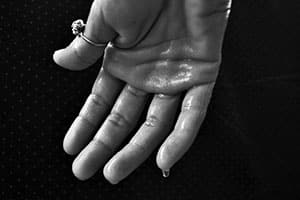 Perspiration is the act and result of sweating . This action (perspire), meanwhile, consists of exuding : causing a liquid to come out through the cracks or pores of a body.
Perspiration is the act and result of sweating . This action (perspire), meanwhile, consists of exuding : causing a liquid to come out through the cracks or pores of a body.
In the case of humans, perspiration or perspiration is a body cooling mechanism that consists of the secretion of sweat through the sweat glands . Sweat is a transparent fluid that has chemical characteristics similar to those of urine. There are animals, such as pigs and dogs, that do not sweat and rely on other resources.
When the temperature is very high , in short, a person begins to sweat. Perspiration also appears if the individual is doing intense physical activity or even when they feel afraid , since an excitation of the sympathetic nervous system occurs.
Sweating usually occurs in the armpits, palms of the hands, feet and face. If perspiration involves excessive secretion of sweat , this is a disorder known as hyperhidrosis .
Since perspiration is potentially different in each individual, it is not always easy to detect a case of hyperhidrosis. For this reason, health professionals indicate that we should go to their office if sweating is accompanied by chest pain, anxiety, social isolation, nausea or a feeling of lightheadedness. In short, if instead of being a natural phenomenon it begins to interfere with our daily lives, it is surely a problem.
In a normal situation, only when the body temperature exceeds a certain level do the sweat glands activate and then perspiration begins. However, in a case of primary focal hyperhidrosis , the most common of all, the nerves that must send signals to the sweat glands enter a state of hyperactivity that is unrelated to body temperature. This becomes worse if the person becomes stressed or very nervous.
There is no well-defined cause for this type of hyperhidrosis, although it is believed that it may be hereditary, since it is common for it to occur in more than one member of the same family.
On the other hand, if excessive sweating occurs as a result of an illness , then it is called secondary hyperhidrosis , and it is the least common type. Unlike primary focal disease, which is mainly seen in the hands, feet and, in some cases, the face, secondary focal disease can affect the entire body. Among the disorders that can trigger it, the following stand out:
* diabetes;
* menopause (particularly during hot flashes);
* any problem that affects the thyroid glands;
* blood sugar deficiency;
* certain types of cancer;
* a heart attack;
* infections;
* problems in the nervous system.
 Secondary hyperhidrosis can also arise due to the action of certain drugs, or withdrawal from analgesic medications known as opioids . This health problem can lead to a skin infection , in addition to having a considerable impact on social life.
Secondary hyperhidrosis can also arise due to the action of certain drugs, or withdrawal from analgesic medications known as opioids . This health problem can lead to a skin infection , in addition to having a considerable impact on social life.
It is important to mention that poor perspiration is also a health problem: anhidrosis . This condition can be dangerous due to the body overheating.
The characteristic odor of perspiration, on the other hand, is due to the combination of sweat and bacteria found on the skin. To minimize it, in addition to showering frequently, you can use deodorants and antiperspirant products .
Plant transpiration , finally, is the process that plants develop to expel water vapor. This is done through the stomata and membranes found in superficial cells.
